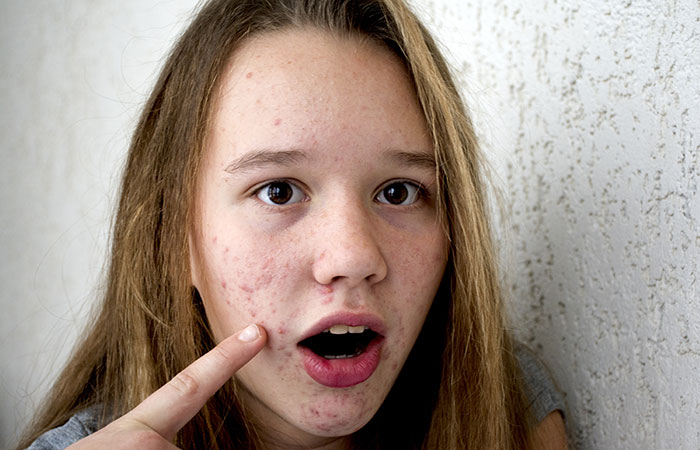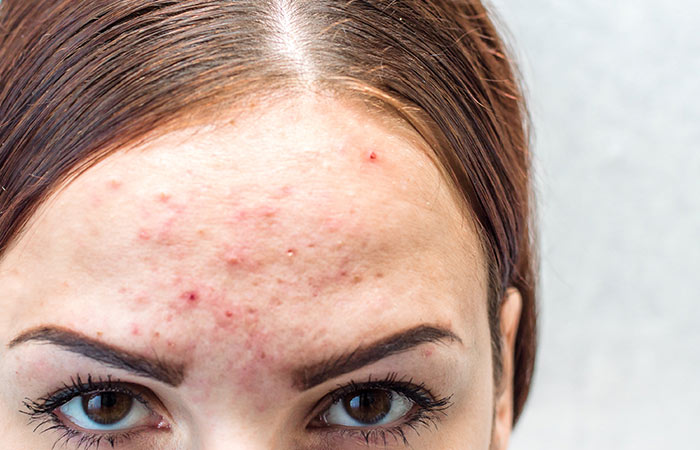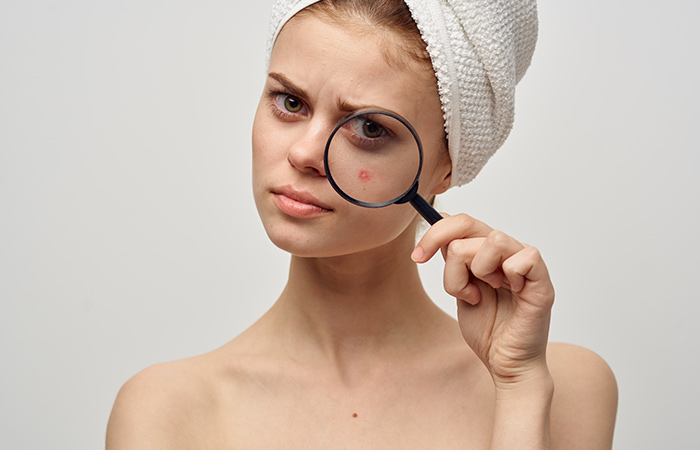Ramona Sinha
Let’s face it – there’s no escape from acne. We all get it from time to time. Some disappear with treatment while some refuse to go away. These are painful and look red and angry. If that’s the case with you, it’s highly likely that you have hormonal acne.
Hormonal acne has a deep connection with the fluctuations in the hormone levels in your body. Let’s understand what it is and how you can improve your condition.
Table Of Contents
- What Is Hormonal Acne?
- What Are The Causes Of Hormonal Acne?
- How To Treat Hormonal Acne
- Hormonal Acne: Foods To Avoid
What Is Hormonal Acne?
When your hormone levels fluctuate, you get hormonal acne. Hormonal acne is much more common in adults than in teenagers.
Compared to men, this is more common in women as multiple factors, such as the menstrual cycle and menopause, affect the hormone levels in women. Hormonal issues associated with underlying medical conditions (such as Polycystic Ovarian Syndrome) may also cause hormonal acne.
The most common symptoms of acne include:
- Cysts
- Nodules
Both cysts and nodules are commonly seen in adults. The other less common symptoms include:
- Papules
- Pustules
- Whiteheads
- Blackheads
These are commonly seen in teens. When we talk about hormonal acne, it mostly refers to “cystic acne” in adults. While regular acne (like blackheads and whiteheads) are commonly seen in teenagers and are caused by hormonal factors, these are not considered “hormonal acne.”
Women may experience hormonal acne during pregnancy and menopause. The changes in the hormone levels make them break out.
Apart from hormones, several other factors that can cause hormonal acne.
What Are The Causes Of Hormonal Acne?
1. Stress
When you are stressed, your body increases the production of androgens (a group of hormones). These hormones stimulate the sebaceous glands and your hair follicles, which causes acne.
2. The Hair And Skin Care Products You Use
The chemicals in these products may clog your skin pores and cause acne. So, before you buy any hair care or skin care product, make sure that they are non-comedogenic and oil-free.
3. Side Effects Of Certain Medication
Certain medicines might trigger acne (such as lithium or an anticonvulsant). If you think that the medicines are causing acne, talk to your doctor immediately. If the medicines can’t be changed, consult a dermatologist to control your acne.
4. Underlying Medical Conditions
Underlying medical conditions (such as PCOS) may also trigger acne. Often, diagnosing and treating the condition clears the acne.
You can take medications or follow natural remedies to improve your condition.
How To Treat Hormonal Acne
Medicines To Improve Hormonal Acne
1. Birth Control Pills
Birth control pills are not merely contraceptives – they can also help in reducing acne breakouts.
A study conducted by the Cochrane Group examined 31 trials involving 12,579 women. The author of the study concluded that all combination contraceptive pills were effective in improving both inflammatory and non-inflammatory acne (1).
Another study found that contraceptives containing drospirenone were less effective in controlling acne than pills that had norgestimate (2).
However, birth control pills should be taken with caution. Always consult your doctor before taking any pills.
2. Retinoids
If you have mild hormonal acne, you can use topical retinoids to improve your condition. Retinoids are derivatives of vitamin A and very effective in treating acne. They are mostly available as creams, lotions, and gels. However, the strength of the formula required to treat your acne has to be determined by a doctor. Hence, avoid self-medication.
The most commonly available topical retinoids include Adapalene, Tretinoin, retinol, and Retinaldehyde (3).
3. Androgen Receptor Blockers Or Anti-Androgen Medications
Both men and women have androgen (the male hormone) in their body, but too much of it can cause acne. This is because androgen increases the sebum production in your skin.
Several androgen receptor blockers have been used for controlling androgen-induced sebum production and acne. These are Spironolactone, Cyproterone acetate, and Flutamide (2). These drugs help in bringing down the levels of androgen. However, it’s better not to use androgen receptor blockers on men as they might cause erectile dysfunction and gynecomastia.
4. Benzoyl Peroxide
Benzoyl peroxide has been used for treating acne for decades. It is one of the most popular choices for treating acne because of its antibacterial properties (it can kill P. acnes and S. aureus bacteria). It is moderately comedolytic (prevents comedones) and keratolytic (treat warts and lesions) (4).
If you are keen on trying natural remedies, I have got your back. These natural remedies may not be as effective as acne medications, but they do not have any side effects. Let’s check them out.
Natural Treatment Options For Hormonal Acne
1. Tea Tree Oil
Tea tree oil has an anti-inflammatory effect, which is beneficial in improving acne, especially mild to moderate acne. A randomized, double-blind, placebo-controlled study involving 60 patients found that 5% topical tea tree oil was effective in reducing acne inflammation by 43.64% (after six weeks of treatment) (5).
2. Green Tea
Green tea contains polyphenols, which, when taken orally or applied topically, help to reduce sebum production and treat acne. In a single-blind randomized trial, researchers used 2% tea lotion for treating acne. 85% of the subjects experienced a significant reduction in acne (decreased by 50%), while 15% did not respond to treatment (6).
Self-care is equally important for improving acne. If you do not take care of your skin properly and neglect it, no medication can help. Here are a few tips you can follow to take care of your skin:
- Use a gentle cleanser to clean your skin twice daily. Do not overdo it as it can irritate your skin further.
- Always use warm water to clean your face or the affected area. Never use hot water.
- Avoid using scrubs on your face as the friction can worsen your inflammation.
- No touching, no picking – as doing so slows down healing.
- Avoid using makeup on your skin. However, if you are applying makeup, look for non-comedogenic products. Avoid using too much of the product.
Your diet is also linked to your acne condition. Though diet may not cause hormonal acne, it can definitely worsen it. Dietary fat and carbohydrates can increase your sebum production. It was found that people who followed a low glycemic diet did not suffer from acne (7). Here is a list of foods you should avoid to prevent your acne from getting worse.
Hormonal Acne: Foods To Avoid
1. Refined Grains
It was found that people who consumed refined carbohydrates suffered from acne compared to those who did not (8). Consuming added sugar also exposes you to the risk of developing acne (9). Avoid these foods:
- Pasta (made with white flour)
- Cereals
- Bread (made with white flour)
- Aerated drinks, soda, and any sugary drink
- Sweeteners such as maple syrup, honey, and cane sugar
2. Dairy
There’s a link between milk and acne (10). While milk may not cause acne, it can worsen your existing acne. Milk also increases insulin levels (11). This can aggravate your acne. Avoid:
- Milk
- Other dairy products such as cheese and ice cream
3. Fast Foods
The Western diet is characterized by high intake of high calories, fat, and high GI foods (12). In a study involving 2,300 men, it was found that eating cakes, pastries, burgers, and sausages frequently increased the risk of acne (13).
4. Chocolates
There’s an ongoing debate on whether chocolate triggers acne or not. However, a study involving 25 acne-prone men found that consuming normal amounts of dark chocolate for four weeks caused acne flare-ups (14).
Caring for acne doesn’t stop here. Skin care requires commitment. Once your acne is gone, it is important to stick to a healthy lifestyle and follow a healthy skin care routine to prevent its recurrence.
Hope this article helped you get an insight into hormonal acne. If you have any doubts, post your questions in the box below.
References
- “Effect of birth control pills..”, Cochrane
- “Hormonal Treatment of Acne in Women”, The Journal of Clinical and Aesthetic Dermatology
- “Acne Vulgaris..”, Indian Journal of Dermatology
- “Over-the-counter Acne Treatments”, The The Journal of Clinical and Aesthetic Dermatology
- “The efficacy of 5% topical..”, Indian Journal Of Dermatology, Venereology, Leprology
- “Green Tea and Other Tea Polyphenols..”, Antioxidants
- “The relationship of diet and acne”, DermatoEndocrinology
- “Differences in Dietary Glycemic..”, Journal Of The Academy of Nutrition and Dietetics
- “Acne: prevalence and relationship..” Journal of European Academy of Dermatology and Venereology
- “ Milk Consumption..”, Dermatology Online Journal
- “High intake of milk..”, European Journal of Clinical Nutrition
- “Dietary intervention in acne..”, DermatoEndocrinology
- “Acne..”, Journal of European Academy of Dermatology and Venereology
- “Dark Chocolate..”, International Journal of Dermatology
Recommended Articles:
- VLCC Tulsi Acne Clear Face Wash Ingredients
- Clinique Even Better Clinical Dark Spot Corrector Review
- Innisfree Bija Cica Balm Benefits




